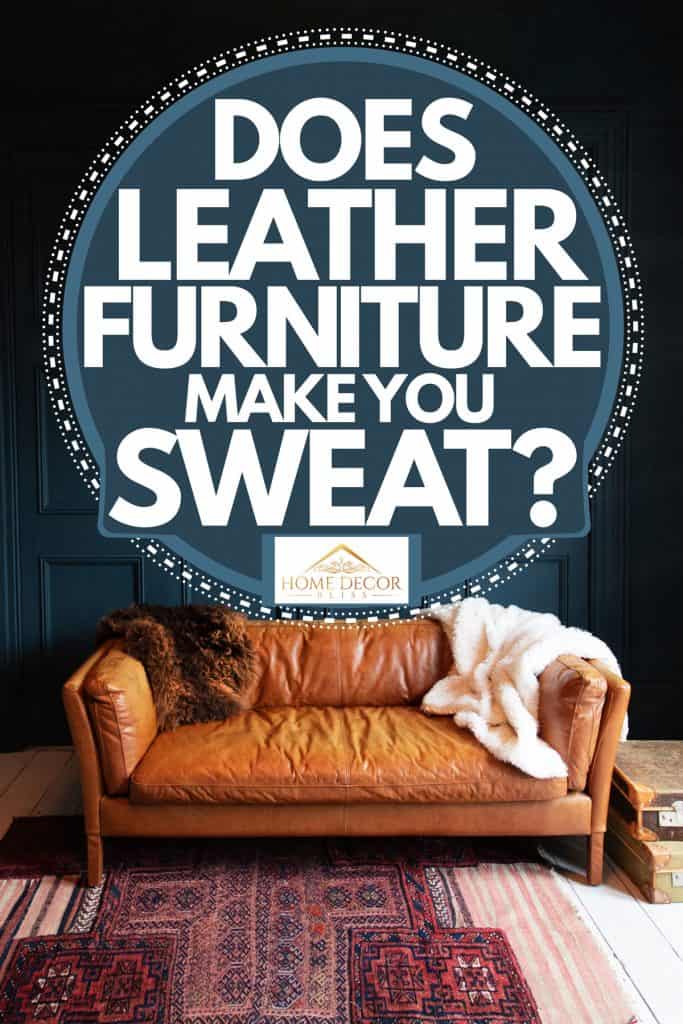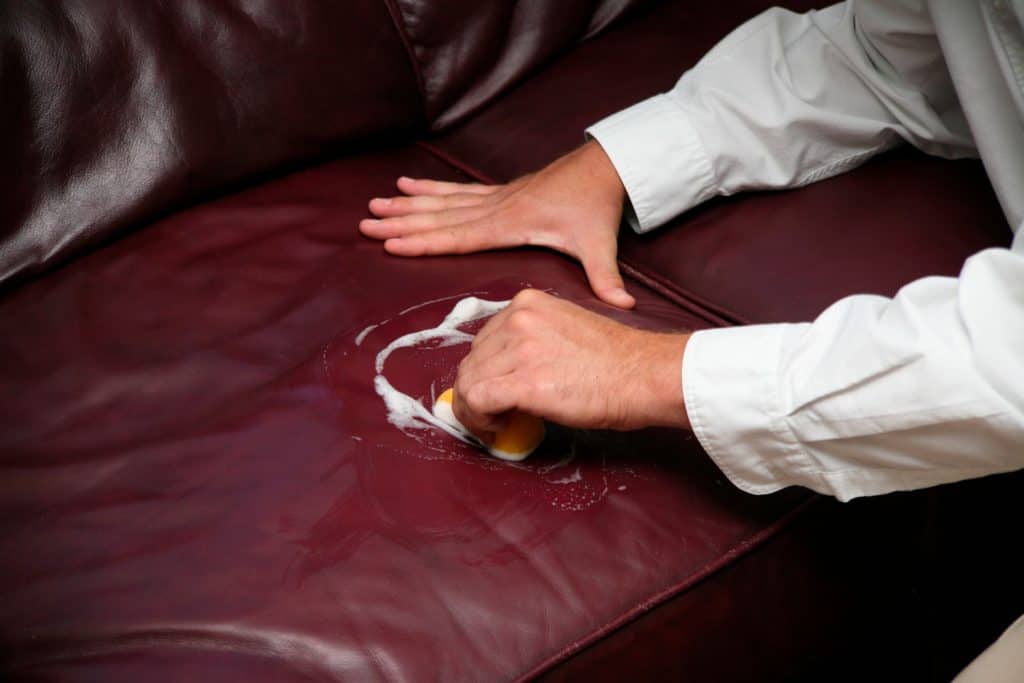Most people consider leather furniture to be luxurious, long-lasting, and classy. Other people, however, don't get the leather love and would prefer a different material for their furniture. One frequent complaint is that leather furniture makes some people excessively sweaty. Is this true?
Leather itself doesn't make you sweat. However, it might feel that way since leather tends to reflect the temperature of its surroundings. This means that your body heat will make the leather feel even warmer. Also, pay attention to whether or not the furniture is actual leather. Faux leather is less breathable than other fabrics and might make you excessively warm.
If you're considering investing in some leather furniture, we understand that you want to make sure you're going to love it. That's why we've researched this topic and have put together all the available information into this handy guide. Keep reading for further explanation about why some people say leather makes them sweat, tips on how to protect your furniture from sweat, and answers to other questions. Let's go!

Does Leather Furniture Make You Sweat?
We sometimes add affiliate links and content that was curated and created by our team with the help of advanced ai tools to help showcase the best design styles.

There are a few different factors that might be convincing you that leather makes you sweat more than other materials. Not all of them are bad, necessarily, and most are just part of owning leather furniture.
Faux leather
First of all, the term leather is used to describe any leather-like material. Real, genuine leather is expensive and relatively rare. But manufacturers have discovered cheaper ways to reap the benefits of leather.
These cheap versions -- often called faux leather or pleather -- are made out of either polyurethane (PU) or polyvinyl chloride (PVC). This second type, also known as vinyl, is the most common material for faux leather. Unfortunately, these knockoffs lack some of the features that make leather so popular.
One of the things that vinyl lacks is the breathability and porousness of real leather. This will give users the feeling that they're sweating more than normal since there's no way for the sweat to evaporate. If you find yourself sweating excessively while sitting on leather furniture, there's a chance it's actually vinyl leather.
Temperature reflection
Leather reflects the temperature of the room. If the room is warm, so is the leather; if the room is cold, so is the leather. The fancy, scientific term for this phenomenon is that leather has high thermal conductivity. It's the way many animals regulate body temperature.
This also happens when your body creates heat and touches the leather. The leather takes on your body's warmth, which is then reflected onto you. Because of this, leather will feel warmer than other materials up to a certain point. That property of leather might make you sweat more, but will sometimes make you feel chillier until the temperature adjusts.
Non-absorbent material
Leather is thicker and more durable than other materials. This means that when you sweat, it isn't immediately dried into the leather. Picture this: you get out of the pool and want to dry off. There's a piece of leather next to a beach towel on a rack. Which do you grab? Most of us would pick the towel because cotton is far more absorbent than leather.
Other materials help your sweat dry up quickly, and probably without you even noticing. This doesn't mean that leather is immune to sweat and other bodily oils, but we'll talk more about that below.
Trying to find the best leather couch of all time? Check out this article for advice: 9 Types Of Leather Couches By Leather Type.
What does sweat do to leather?
Even though leather is a thick, durable material, it can still be harmed by sweat and the other oils our bodies produce. You might be surprised to know that the oil on the ends of your fingers contains salts, enzymes, and fatty acids. Each time you touch the furniture, you're transferring these substances to the leather.
That's normal and usually isn't enough to harm the leather. But over time, frequent and sustained touching can mess with the pH balance of the material. These substances weaken the fibers of the leather and can tear holes and otherwise damage the material.
Have you noticed your leather furniture flaking or getting dark spots? This is the first sign that your sweat is damaging the leather. Look closely at the head and armrests, or other places where your bare skin comes into contact with the leather. Is there any discoloration? This is probably a sign that your bodily oils are damaging the furniture.
If the sweat damage is further along, you might notice cracking, peeling, and tearing leather. Ideally, you can prevent this damage. Otherwise, you're looking at more difficult and expensive repairs.
Need to repair a hole in your leather furniture? This article is sure to help: How To Fix A Large Hole In A Leather Couch
How do you keep from sweating on leather?
Here are some tips to keep excess sweat off your leather furniture:
- When you sit on the sofa or chair, make sure to vary your location frequently. We know that you have your favorite spot on the couch, but switch it up every once in a while. A little bit of sweat on leather won't hurt it too bad, but repeated exposure to the oil can cause damage.
- Don't sit on the leather when you're extremely sweaty. When you come into the room after your workout or a long day of work, go take a shower before sitting down.
- If you must sit down while sweaty, put down a towel, blanket, or another absorbent material. Try not to let your skin come into contact with the leather.
- Wear long sleeves or pants when you haven't showered in a while. Again, the problem with sweat on leather comes from your bare skin. Protect it with clothing to form a practical barrier.
How do you get sweat out of leather?
Let's say you've already noticed that your sweat has damaged your leather. Can it be cleaned? Yes! Be careful, however, as cleaning the leather incorrectly can cause more damage than the sweat. Always dry the leather quickly, since leather can tighten and dry out when the liquid evaporates.

1. Mix one teaspoon of dish soap into a quart of water. Stir it around to create suds. The soap should be mild, like the one below. The water should be warm without being hot since hot water can discolor the leather.
Click here to view this soap on Amazon.
2. Dip a sponge or clean cloth into the soap suds. The idea is to get as little water as possible in the cloth or sponge, but if you get some, make sure to wring it out before putting it on the leather. Remember that water is harmful to leather.
3. Rub the suds onto the sweat marks in a circular motion. Use more suds as necessary and scrub until the mark is gone.
4. Wipe the spot dry with a clean, dry cloth. Again, make sure to dry all the wet spots. If there's still a mark, repeat the above steps until it's gone.
5. Apply a leather conditioner like the one below to the spot you've just cleaned. This will help the material retain its moisture to keep from splitting and cracking.
Click here to view this leather conditioner on Amazon.
Want more details on how to clean leather? Read this article next: How To Clean A Leather Couch [3 Steps]
Does sleeping on a leather couch ruin it?
Sleeping on your leather couch won't ruin it immediately, but too many nights on the sofa will create excessive wear and tear. Remember the yucky sweat and oils we discussed above? Your body produces more of it while sleeping. To make matters worse, these greases are pressed into the couch for as long as you stay in one sleeping position. They don't dry or evaporate if you're in the same position, either.
In addition to the extra damage to the leather, too much weight on the couch for extended periods of time will wear out the padding and structure of the sofa. Putting all of your weight on the sofa -- as opposed to some of it being on the floor -- isn't good for it.
But don't worry too much about an occasional nap on the couch. What good is it if you can't get full use out of it? Beware, however, that repeated misuse of the furniture will shorten its lifespan.
In Closing
Leather has many benefits but can give the impression that the person sitting on it is sweatier than normal. This might be because leather reacts to the surrounding temperature, is thick and durable, or it's fake leather. Sweat and body oils can be harmful to leather, so treat it well and clean it often.
If you decide to go with leather furniture, we hope this article has helped you feel more confident about your decision. Good luck!


